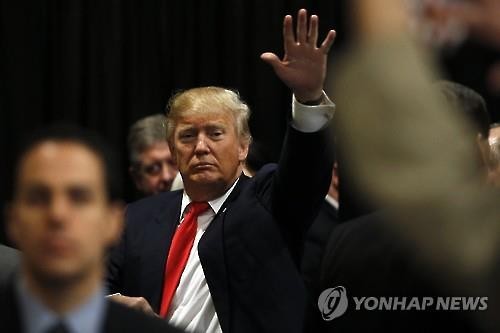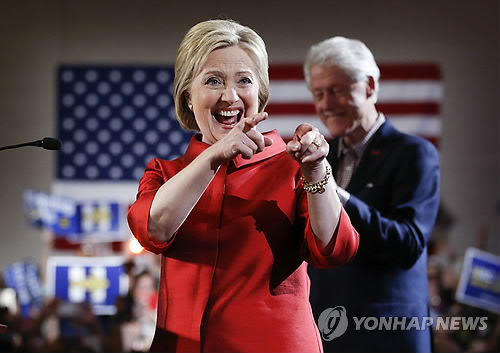Donald Trump widened his lead over the Republican party’s presidential field claiming a big victory on Saturday as the contest moved into the South. Out West, Hillary Clinton beat Vermont Sen. Bernie Sanders for a crucial win in Nevada’s Democratic caucuses.
Former Florida Gov. Jeb Bush, who had done poorly in the first three early Republican contests, suspended his campaign after a disappointing fourth place finish in South Carolina.
Clinton and Trump’s victories put them in strong positions as the 2016 presidential election barreled toward the March 1 Super Tuesday -- the multi-state voting contests on March 1.
“There’s nothing easy about running for president,” Trump said at his victory rally. “It’s tough, it’s nasty, it’s mean, it’s vicious. It’s beautiful -- when you win it’s beautiful.”
Clinton’s roughly 5-point win eased the rising anxieties of her backers, who feared a growing challenge from Sanders.
 |
(Yonhap) |
Trump’s strong showing in South Carolina marked his second straight victory in the Republican primaries and strengthened his unexpected claim on the party nomination. No Republican in recent times has won New Hampshire and South Carolina and then failed to win the nomination.
Ted Cruz and Marco Rubio, a pair of freshman senators, were locked in a race for second place in South Carolina. Bush and other candidates lagged far behind.
“This has become a three-person race,” Rubio said of his strong finish, which with Bush leaving the race, bolsters his case that he is the candidate of mainstream Republicans.
Cruz, who has run as a political outsider, harked back to his win in the leadoff Iowa caucuses as a sign he was best positioned to take down Trump. He urged conservatives to rally around his campaign, saying pointedly, “We are the only candidate who has beaten and can beat Donald Trump.”
For both parties, the 2016 election has laid bare voters’ frustration with Washington and the influence of big money in the political system. The public mood has upended the usual political order. That gave Sanders, who put up a stiff challenge to Clinton in Nevada, and Trump openings over many more mainstream candidates.
 |
(Yonhap) |
In Nevada, Clinton won the backing of voters who said electability and experience were important in their vote. But in a continuing sign of her vulnerability, Sanders did best with voters looking for a candidate who is caring and honest.
She capitalized on a more diverse Democratic electorate who helped her rebound after a second-place finish to Sanders in the New Hampshire primary.
“Some may have doubted us, but we never doubted each other,” Clinton told her cheering supporters during a victory rally in Las Vegas. “This one is for you.”
She said Americans are “right to be angry,” but are also hungry for “real solutions.”
Sanders, a self-described democratic socialist, congratulated Clinton on her victory, but then declared his campaign has “the wind at our backs as we head toward Super Tuesday.”
Clinton’s victory could be vital in pushing back the Sanders challenge that has been tougher than almost anyone expected. Clinton narrowly won the leadoff caucuses in the Midwestern state of Iowa, but the Vermont senator had a runaway victory in the tiny northeastern state of New Hampshire.
Clinton now leads in delegates pledged to her at the Democratic Party‘s national convention in July, but only has a fraction of the number needed to secure the nomination. Clinton’s win means she will pick up at least 18 of Nevada’s 35 delegates. Trump also is accumulating a delegate lead among Republicans.
No candidate has shaken the establishment more than Trump. He spent the week threatening one rival with a lawsuit, accusing former President George W. Bush of lying and even tangling with Pope Francis on immigration.
The Trump win drove Bush, once the front-runner, who was counting on his family’s broad popularity in South Carolina, out of the race. Bush is the son and brother of former presidents.
Now, the Trump victory foreshadows a solid performance in the collection of Southern states that vote on March 1. Victories in those Super Tuesday contests could put the billionaire in a commanding position in the delegate count, which determines the nomination at the party’s national convention in July. (AP)





![[Herald Interview] 'Trump will use tariffs as first line of defense for American manufacturing'](http://res.heraldm.com/phpwas/restmb_idxmake.php?idx=644&simg=/content/image/2024/11/26/20241126050017_0.jpg)


![[Herald Review] 'Gangnam B-Side' combines social realism with masterful suspense, performance](http://res.heraldm.com/phpwas/restmb_idxmake.php?idx=644&simg=/content/image/2024/11/25/20241125050072_0.jpg)
![[Health and care] Getting cancer young: Why cancer isn’t just an older person’s battle](http://res.heraldm.com/phpwas/restmb_idxmake.php?idx=644&simg=/content/image/2024/11/26/20241126050043_0.jpg)